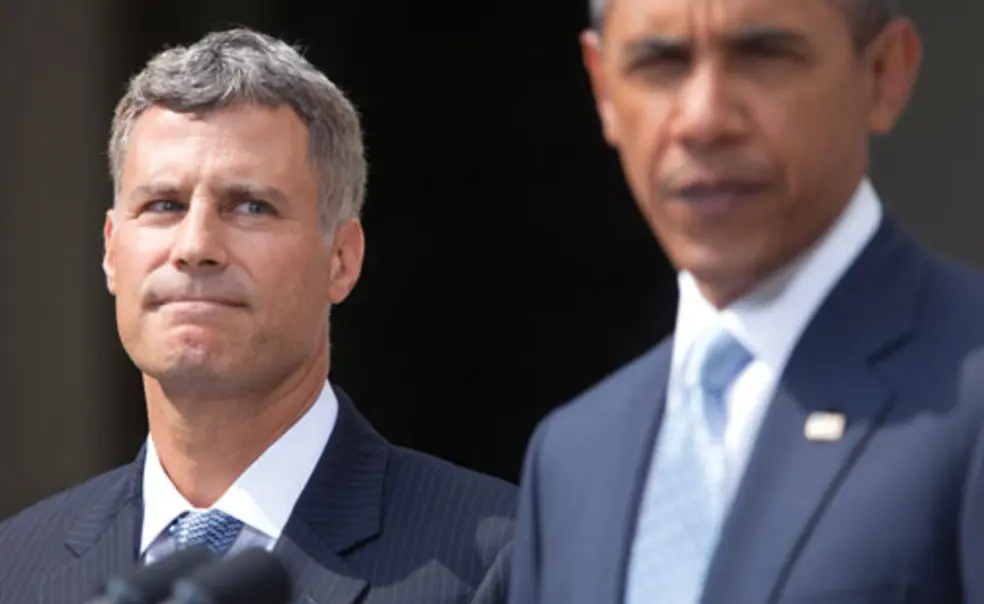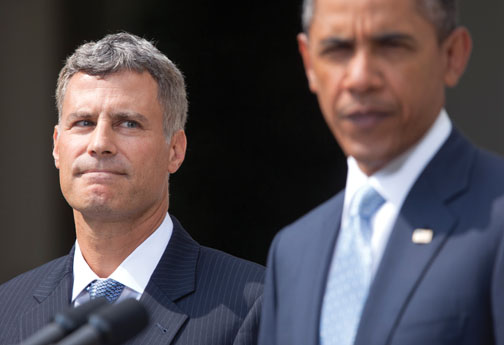Labor-expert Krueger nominated as top economic adviser to Obama
With 14 million Americans unemployed and his own job in jeopardy, President Barack Obama nominated a labor economist to chair his Council of Economic Advisers and help steer the country out of its protracted slump: Princeton’s Alan Krueger.
Krueger returned to campus in the fall of 2010 after an 18-month stint as the Treasury Department’s chief economist, where the president said his counsel “proved invaluable” in coping with the financial crisis the administration inherited.
“He’s about as respected a labor economist, observer of the middle class, and analyzer of job markets as exists in the world,” said Austan Goolsbee, who stepped down as chairman of the Council of Economic Advisers (CEA) in June. “He’s a perfect match for the moment, where it’s all about a jobs plan.”
Krueger, 51, the Bendheim Professor in Economics and Public Policy, is an expert on job markets, income inequality, and unemployment. As part of Treasury Secretary Timothy Geithner’s brain trust (and his frequent tennis partner), Krueger was an architect of the Build America Bonds program, which Treasury calculates saved state and local governments $20 billion in interest on public infrastructure projects, but was terminated by Republicans at the end of 2010. Krueger also worked on the president’s Small Business Lending Fund and Car Allowance Rebates, or “cash for clunkers” program, both of which drew opprobrium from some conservatives.
But Krueger’s data-driven, empirical research has earned respect in many quarters, and the nomination won praise from economists as diverse as Martin Feldstein and Joseph Stiglitz.
Gene Grossman, chairman of Princeton’s economics department, called Krueger “an ideal choice” who would “bring just the right microeconomic perspective to the current policy discussions about how to deal with the long-term unemployed.”
Alan Blinder ’67, a colleague in the economics department and CEA member in the Clinton administration, told The Washington Post that, realistically, the time for a huge stimulus is past, “but the urgency of doing something about employment is not gone. And what Alan represents is trying to think about programs — some small, some very small, some modest-sized — that can do something about that.”
If the challenge in 2009 was pumping nearly $800 billion in stimulus funds into the economy, the challenge before Obama and the country now is how to get private employers hiring again after three years of unemployment stuck around 9 percent and Republicans dug in against further deficit spending.
The $447 billion jobs bill the president unveiled a week after nominating Krueger is certain to face a hard slog in the divided Congress. Convincing senators to confirm him once again, as they did in 2009, was likely to pose far less difficulty. (As is customary, Krueger was unavailable for comment pending confirmation. A Senate committee was expected to move swiftly to schedule a hearing, bring the nomination to a vote, and send it to the Senate floor.)
Krueger, the founding director of the Princeton Survey Research Center, was the Labor Department’s chief economist for two years in the Clinton administration. In addition to his work on labor and unemployment, he has written a book on what motivates terrorists (it’s not poverty or lack of education, he says) and weighed in on contentious education debates about class size and vouchers (black students benefited from smaller classes in a Tennessee experiment, but only modestly from vouchers in New York City). A Krueger study of fast-food restaurants in New Jersey upended the conventional wisdom that raising the minimum wage destroys jobs.
Krueger’s data-driven studies have led him to question whether money equates to happiness, and whether bright students actually get a bump in earnings from attending an elite university (although his data suggested it may do so for minorities). He also has examined the escalation of ticket prices for rock concerts.
Peter Orszag ’91, Obama’s first Office of Management and Budget director and a former student of Krueger’s, said the CEA choice would fit right in with a president who always demands to know what the data show. “He’s simpatico,” Orszag said.
Princeton’s economics department has had a pipeline to the CEA in recent years in both Democratic and Republican administrations, including Blinder, George W. Bush appointees Harvey Rosen and Ben Bernanke, and Cecilia Rouse, who rejoined the faculty after two years as an Obama appointee.













No responses yet